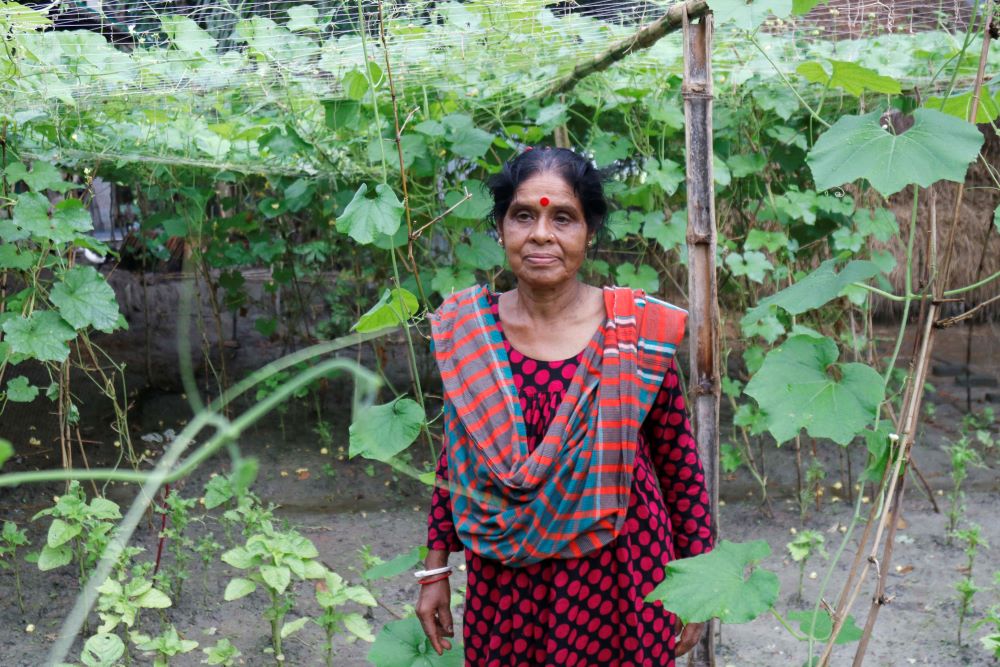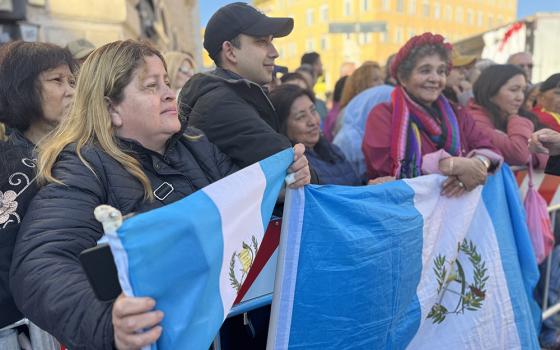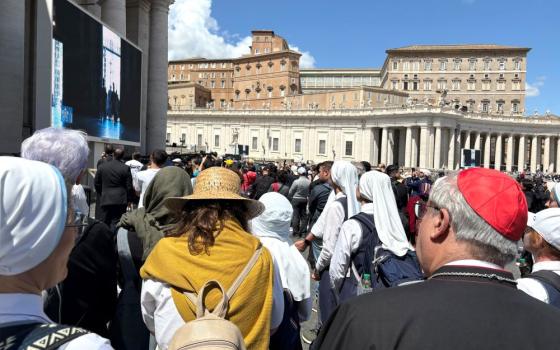A church official distributes trees among lay people in the coastal Satkhira district. (Stephan Uttom Rozario)
The Bangladesh government has said that to achieve the U.N.'s 2030 sustainable development goals, the government is implementing various programs with utmost importance on nature and environment conservation. They are prioritizing new economic zones and industrial establishments to ensure compliance with environmental regulations.
The government also has adopted the blue economy action plan with the aim of including conservation of marine environment, prevention of marine pollution and sustainable management of marine resources in mainstream development.
But environmentalists and church officials have described the government's approach as, "More talk, no action."
In the name of social forestry, the government is doing environmentally destructive things, like destroying natural forests, constructing coal-based power plants near the mangrove Sundarbans, developing "eco-parks" in natural forests and building roads through forestland.
"The government of Bangladesh is speaking a lot of good words about environmental protection, going to international conferences and saying good things, but it is not working that way," said Holy Cross Fr. Hubert Liton Gomes, secretary of the Episcopal Commission for Justice and Peace for the Catholic Bishops' Conference of Bangladesh, or CBCB.
Although the Catholic Church makes up less than 0.5% of the population in Bangladesh, groups inspired by Pope Francis' encyclical Laudato Si' are responding to environmental degradation in the country with conservation efforts.
Catholic youth commission
"Just as I became aware of planting trees for the environment, I also worked to inspire others to plant trees. My yard now has no shortage of trees and no empty spaces. I learned these from the seminars of Laudato Si'," said Xavier Oli Minj, an Oraon Indigenous youth from the northern Dinajpur district of Bangladesh.
Bishop James Romen Boiragi, bishop of the Khulna Diocese, and a Caritas Bangladesh official plant trees in the coastal Shyamnagar area of Satkhira district, Bangladesh. (Stephan Uttom Rozario)
Minj, 29, has been associated with the CBCB's youth commission since 2014. He now serves as the secretary of the Dinajpur Diocese youth commission.
"As I have participated in various programs or seminars offered by the youth commission and other CBCB commissions as a result of my involvement with the youth commission, I have had many sessions on the Holy Father pope's encyclical Laudato Si', which had important information on nature and the environment," Minj told EarthBeat.
The Dinajpur Diocese's youth groups worked on one project together. Each individual challenged themselves to plant a tree and ask two friends to plant trees. And they have succeeded in this challenge.
At least 400 youths planted at least one tree each during the Bangladesh Catholic Church's 38th National Youth Day Feb. 17–21, 2023. Participants also to reduce the use of polythene, a type of plastic, and not to litter as efforts to protect nature.
"Now I don't throw any garbage on the road, which I used to throw before. Now after eating a chocolate, I keep its shell in the pocket and later throw it in the designated place. In other words, as I have taken care of your common home in my heart, I am also trying to teach this to others," Minj said.

Latika Mandal, 60, preserves Indigenous varieties and plants them in backyards. She has about 150 varieties of Indigenous vegetable seeds. Now she fulfills her needs by selling seeds in the market. (Stephan Uttom Rozario)
'Laudato Si' ' movement Bangladesh
Some actions being taken by Catholics across Bangladesh include driving less, walking more, using less water, planting trees in empty spaces and changing eating habits to consume less meat and grow more vegetables without chemicals.
Gomes said that organizations can enforce policies to protect the environment and people's livelihoods.
"We are green, we are clean" was the theme when the Bangladesh Catholic Church observed its first Laudato Si' Week in 2021 and launched a campaign to plant 400,000 trees as an ambitious initiative to celebrate the anniversary of Laudato Si'.
Gomes told EarthBeat that the "One Catholic, One Tree" program was successful. "We have planted more trees than our target, as Caritas Bangladesh and various Catholic-run institutions have planted trees separately. Many trees have been planted by our student organizations, and different religious communities across the country," he said.
"God created the world and told us to prosper in it but we are destroying it. We all have resources, but these resources are being wasted due to the aggressive attitude of some. And as a result, some regions of the world are suffering more and Bangladesh is one of them that are suffering more from environmental disasters and will be. Then let the consciousness come into us that we are suffering. That's why we want people to think about it and save the environment according to the Holy Father's encyclical Laudato Si'," the priest said.
According to Gomes, they have already involved 80% of Catholic Church-run educational institutes, many youth organizations and some financial organizations in the Laudato Si' Movement Bangladesh.
While the Laudato Si' Movement has many strengths, it also has some weaknesses, according to Minj. For example, it has been difficult to connect youth or people at the grassroots level with this platform. Connection to the Laudato Si' Movement has come primarily through the climate desk of the CBCB.
Advertisement
"We have done a lot of work on it in the cities but not enough at the village level or in the periphery. Even in the Sunday Mass, I have not heard one of the priests say this about Laudato Si' or about the environmental disaster and what we have to do, which is depressing," Minj told EarthBeat.
Gomes pointed to one weakness of the movement. "We have not enough financial capacity to do huge work all over the country," he said. "Another thing is, few clerics are also not aware of the environment and the Laudato Si' Movement. But we're still working on it."
Caritas Bangladesh
Following the release of Laudato Si', Caritas Bangladesh has begun specifying how to bring environmental protection into every project, highlighting the importance of the environment.
"Earlier we used to develop projects just to survive, i.e. increase the food production by increasing the development of agriculture, but now we are working on how to survive ourselves by keeping nature alive," said Daud Jibon Das, program director of Caritas Bangladesh.
"We planted more than 1 million trees along with the Catholic Church in 2022–2023, and we are still planting trees in our various projects. We have taken programs like the plastic ban," Das told EarthBeat.
"Laudato Si' opened our eyes. As our work is with all communities, that is why we are highlighting and working to save this environment regardless of caste, or religion," Das added.






